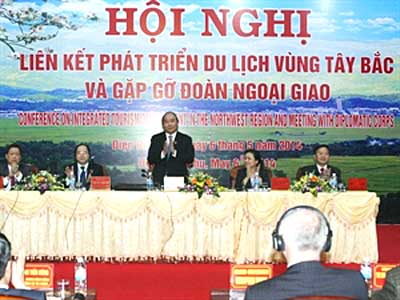A conference was held in Dien Bien province on May 6 to discuss ways to boost links for tourism development in the northwestern region.
Representatives from diplomatic corps of nearly 40 countries and international organisations in Viet Nam attended the event, which was jointly organised by the Steering Committee for the Northwestern Region, the Ministry of Foreign Affairs, the Ministry of Culture, Sports and Tourism, and the provincial People’s Committee.

Chairing the event, Deputy Prime Minister Nguyen Xuan Phuc affirmed that the northwest is a key region for tourism development as it is connected to the glorious history of national construction and defence and boasts a diverse and unique culture.
The region is home to many famous tourist sites, such as the complex of Dien Bien Phu relic sites, the Temple of the Hung Kings, the Dong Van Karst Plateau Geo-Park, Sa Pa , Fansipan Mountain and Hoang Lien National Park.
Tourism connection is an important way to thoroughly tap the potential and strength of each region and locality, turning natural, tangible and intangible cultural values into a means of luring tourists in a sustainable way, he noted.
This is also one of the five main contents of the approved Tourism Development Strategy by 2020, he added.
The Deputy PM instructed relevant agencies and localities to prioritise developing tourism in 12 special areas and four national tourist attractions in the region, and building infrastructure such as roads and hotels.
He also emphasised the need to intensify domestic and international cooperation in tourism development, connect the region’s tourist sites with those of neighbouring countries, train staff and diversify tourism products.
The northwest will be selected for community-based tourism development, Phuc said, adding that the region should preserve world-recognised relics.
He assigned the Ministry of Foreign Affairs to join hands with diplomatic agencies, international organisations and businesses to organise conferences and seminars to promote the region’s tourism.
At the event, participants focused on analysing the reality of regional tourism and its potential, as well as introducing preferential mechanisms and policies for key tourism projects.
They shared experience in establishing links for tourism development in the region.